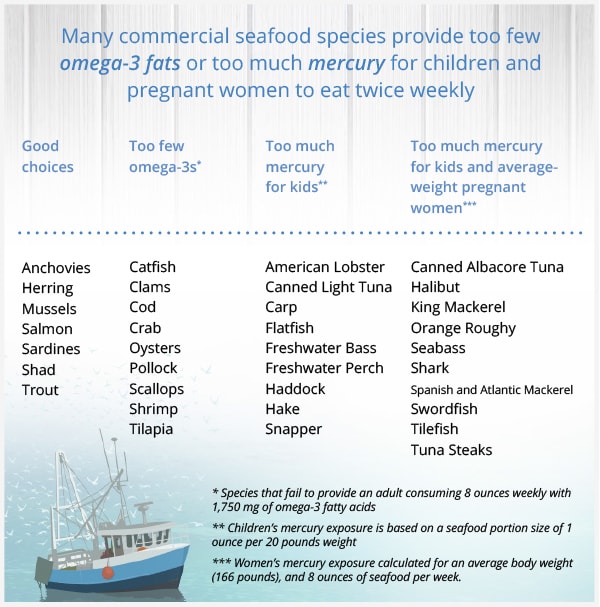I’m a big advocate of fish, as many of you know. Not only does the American Heart  Association recommend 2 or more servings of fish a week, but the American Psychological Association has a similar recommendation for depression and mood disorders. There are so many reasons why fish can be beneficial–omega 3 fatty acids are anti-inflammatory and may help with conditions from high triglycerides, rheumatoid arthritis, macular eye degeneration, high blood pressure and the list just goes on. The omega 3s can also be an IQ booster for babies, too.
Association recommend 2 or more servings of fish a week, but the American Psychological Association has a similar recommendation for depression and mood disorders. There are so many reasons why fish can be beneficial–omega 3 fatty acids are anti-inflammatory and may help with conditions from high triglycerides, rheumatoid arthritis, macular eye degeneration, high blood pressure and the list just goes on. The omega 3s can also be an IQ booster for babies, too.
So I was fascinated to see a new report out from the Environmental Working Group in January 2014 on mercury risk that *ahem!* rocks the boat, because that’s a critical piece of the puzzle and a major stumbling block to eating more fish for many people. The EWG report reviews the literature that goes into the latest data on mercury in fish, and states that following the current EPA guidance isn’t enough to keep people safe from mercury issues, and takes issue with the current “safe dose” methodology. Basically, the big fishies have eaten a bunch of little fishies, and so they bio-accumulate mercury. Not good.
The EWG list goes much further than the EPA guidance, and adds more fish to the “no” column, especially for pregnant women and children: Source: Environmental Working Group, 2014 http://www.ewg.org/research/us-gives-seafood-eaters-flawed-advice-on-mercury-contamination-healthy-omega-3s
Source: Environmental Working Group, 2014 http://www.ewg.org/research/us-gives-seafood-eaters-flawed-advice-on-mercury-contamination-healthy-omega-3s
The EPA guidance is from 2004, and gives some basics on fish to avoid, such as:
- Shark
- King Mackerel
- Tilefish
- Swordfish
My view is that I’d rather have clients be safe than sorry. So the message here shouldn’t be to ditch fish. Instead, choose more wisely. There are still many good options that are both high in omega 3s and low in mercury, such as salmon, sardines, trout, mussles, herring, and even anchovies.
- For those of you who want to eat more fish, but aren’t quite sure how to prep it, I like the book For Cod and Country which does a good job with simple, tasty AND sustainable. How to Cook Everything by Mark Bittman is also one of my favorite basic cookbooks, but doesn’t have the health/sustainability emphasis.
- Wait, wait. Does this mean never ever eating a tuna fish sandwich? Oy. Well, that depends. For children and smaller women, even light tuna once a week is too much. It doesn’t mean never, but for most people, it’s not a good daily or weekly choice.
- What about sustainability and the environment, the politics and health of wild/vs. farmed, etc.? That’s a whole different discussion! The short answer is to check out a seafood guide, such as the one from the Environmental Defense Fund Seafood guide and Monterey Bay Aquarium. They’ve got a nifty (free!) app, too.
- Thinking outside of the fishbowl? How about the flaxseed you’re adding to your yogurt faithfully every day? That has omega 3s, too, as does walnuts, canola oil, soy, chia seed and more. This form of omega 3s, called ALA, does have health benefits. However, it does not seem to have all of the same benefits as the omegas in fish.
- But what about if you’re vegan or allergic to fish? There are DHA supplements available that are derived from algae. Again, our bodies don’t utilize them as well.
Speaking of supplements, generally, a low dose (around 1 gram) is generally considered sa fe, but definitely don’t go for high dose supplements (over 3 grams) without having a chat with your doctor.
fe, but definitely don’t go for high dose supplements (over 3 grams) without having a chat with your doctor.
Recipes: Looking for something fun and delicious to make someone you love (possibly yourself?)
My favorites:
Hubby’s favorites:
Chocolate Covered Candied Orange Peels 
Fun stuff:
I’ll be presenting a webinar for the Tidewater Food Allergy Support Group on Feb 11th, 2014 on “Mission possible: a balanced diet with food allergies.”
Harris Whole Health offers individual sessions, family sessions and group classes to help people eat healthier and feel better! Cheryl works with people to feel and look their best with a range of specialties, including Celiac Disease, food allergies, pregnancy, breastfeeding, vegetarian and vegan diets, preventing diseases and “whole foods” eating. Let’s get you on your way to achieving your goals. For an appointment with Cheryl Harris, Registered Dietitian and Nutritionist, please click here, email or call 571-271-8742.
To subscribe or unsubscribe, see www.harriswholehealth.com


2 Replies to “Go fish–New 2014 Advice”